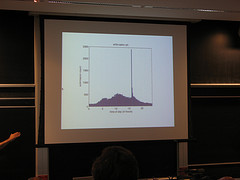A new article today in the Journal of the American Society for Information Science could be of interest to those of you who post their studies to arxiv.org:
A. Haque and P. Ginsparg, “Positional effects on citation and readership in arXiv,” J. Am. Soc. Inf. Sci. Technol., vol. 60, pp. 2203-2218, 2009.
Abstract:
arXiv.org mediates contact with the literature for entire scholarly communities, providing both archival access and daily email and web announcements of new materials. We confirm and extend a surprising correlation between article position in these initial announcements and later citation impact, due primarily to intentional
self-promotion
by authors. There is, however, also a pure
visibility
effect: the subset of articles accidentally in early positions fared measurably better in the long-term citation record. Articles in astrophysics (astro-ph) and two large subcommunities of theoretical high energy physics (hep-th and hep-ph) announced in position 1, for example, respectively received median numbers of citations 83%, 50%, and 100% higher than those lower down, while the subsets there accidentally had 44%, 38%, and 71% visibility boosts. We also consider the positional effects on early readership. The median numbers of early full text downloads for astro-ph, hep-th, and hep-ph articles announced in position 1 were 82%, 61%, and 58% higher than for lower positions, respectively, and those there accidentally had medians visibility-boosted by 53%, 44%, and 46%. Finally, we correlate a variety of readership features with long-term citations, using machine learning methods, and conclude with some observations on impact metrics and the dangers of recommender mechanisms.
** Photo by http://www.flickr.com/photos/easternblot/ – “Paul Ginsparg shows that everyone submits their paper to ArXiv *just* after the submission deadline so they’ll be the first on the front page the next day”

